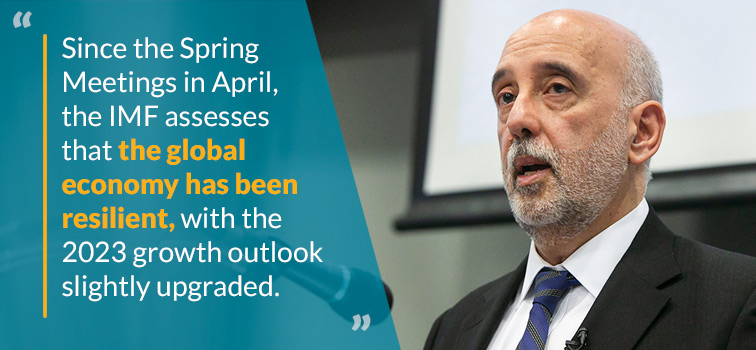The International Monetary Fund and World Bank Annual Meetings 2023
17 October 2023
Blog

I am just back from the International Monetary Fund and World Bank annual meetings hosted by Morocco in Marrakesh. These were the first meetings held in Africa in 50 years (Nairobi in 1973). The meetings bring together central banking colleagues, Ministers, government officials, civil society representatives, business executives and academics from across the world to discuss issues affecting the global economy.
As a small open economy, global developments matter to Ireland. Since the Spring Meetings in April, the IMF assesses that the global economy has been resilient, with the 2023 growth outlook slightly upgraded. But the recovery has been slow and uneven, as activity in many economies remains well below pre-pandemic trends and divergences across countries are rising. The Fund cautions that this leaves little margin for policy error. As set out in its Global Financial Stability Report, risks to global growth remain skewed to the downside as inflation remains above target and interest rates are set to stay higher for longer.
Some of the key themes of discussions last week included:
- The need for Central Banks to restore price stability by bringing inflation to target, while fiscal policymakers were called to tackle soaring public debts and rebuild budgetary room for manoeuvre;
- The need to build resilience in the financial system, for both banks and non-banks, for future stress periods;
- Lower and slower growth in China, particularly the implications for individual economies and global growth, and (to a lesser extent) spillover risks to the financial system;
- Intensifying geo-economic fragmentation, with an almost a threefold increase in trade restrictions since 2019, in addition to other forms of fragmentation (such as technological decoupling, disrupted capital flows and migration restrictions). A particular focus was the implications for the ability of multilateral institutions to provide crucial public goods, such as tackling climate change and future pandemics, and ensuring energy and food security; and
- The Global Financial Safety Net and the role of the IMF at its centre, including the issue of the Fund’s resources and voting rights.
The meetings offer an excellent opportunity to build and strengthen bilateral relationships, especially with countries that are outside of the Eurosystem but also with senior leaders in the IMF.
One of the topics that our interlocutors were interested in was our work on the role that non-banks play in the financial system. We used the meetings to engage the Fund on our common interest in this area. The March 2020 COVID -19 shock and the 2022 Gilt market disruption, highlighted the potential for the funds sector globally to amplify shocks in the face of financial vulnerabilities. These episodes illustrated how financial stability concerns can emanate from this sector, revealing issues around leverage and liquidity mismatch uncertainty. Our recently published Discussion Paper (PDF 1.15MB) is designed to advance the debate on a potential approach to the development and operationalisation of a macroprudential framework for the investment funds sector. The meetings were a good opportunity to exchange ideas, and we look forward to receiving feedback on our paper up to 15 November.
Conclusion
A highlight for me last week was meeting Governor Jouahri of the Moroccan Bank Al-Maghrib and being able to offer both my appreciation for the hosts’ warm welcome and my sympathies on the tragic effects of the earthquake. From my perspective, these Annual Meetings had a particularly sombre backdrop, with the horrific scenes unfolding across the Middle East, the ongoing Russian war against Ukraine and its people, the devastating floods in Libya and other climate-related events across the globe, and the recent earthquakes in Morocco and Afghanistan. We live in a very uncertain and much more dangerous world than we might have thought not so long ago. Strong international institutions and deep international co-operation is needed more than ever and the IMF and World Bank have important roles to play on behalf of all of us.
Gabriel Makhlouf
Read more: